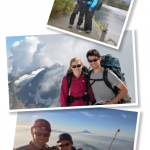This one with nature phase was an epiphany for me; I had never felt this way in my entire adult or professional life. My mind was so refreshed; I was feeling invincible and intellectually unbounded. My perception was totally opposite to any negative attributes of fatigue, stress, burnout, moral injury or soul loss. I had unconsciously transformed all dimensions of being fully human to a normal state: caring for the body, for emotion, for mind, for heart, for creativity, for the spirit and more.3
I remember when I was an undergraduate, professors left for sabbaticals to exercise intellectual work or intellectual contemplation for creative thinking. Today, healthcare providers are rarely eligible for sabbatical time for mental restoration or mental creativity. Josef Pieper references both Aristotle and Aquinas, who believed that intellectual contemplation was critical for human activity and important for human well-being.4
In our culture, physicians are mostly relegated to the tasks of non-intellectual work, but they intrinsically need time away from the workplace for intellectual work by themselves, but also to be part of their community.
In today’s chaotic environment, we all struggle to find solitude and time for self-care. How can we learn to be present in the moment only? How can we leave recent tasks behind and not focus on imminent future responsibilities? How can we dedicate time to solitude for rest or for intellectual contemplation? This is not taught in school or residency or as staff. This requires insight, discipline and a commitment to simply manage our distractions and focus on the true priorities of the moment.
Victor Frankl said: “When we are no longer able to change a situation, we are challenged to change ourselves.”5
Climbing mountains (or similar professional metaphors) can be transformative in the moment, providing a great vision at the pinnacle, looking both backward and forward. Our challenges do not need to be like Sisyphus’ if we can somehow better define our priorities; not all our ideal wants or needs are true priorities.
Hiking in solitary space or creating alone time for extended periods enables mental rest, contemplation, creativity, perspective and can help prevent burnout. Sometimes, just being present is better than doing; sometimes our heart is more important than our mind, and sometimes being mentally grounded, without worrying, even in the presence of others, can be self-preserving.
On Arrival
On arrival in Santiago de Compostela Plaza, we were welcomed with melodious bagpipes sharing the Celtic influence on Galicia. I was standing in the square with innumerable pilgrims cheering, taking selfies, singing and laying down. I had an overwhelming sensation of contentment, peace and gratitude. This was an ineffable experience. Buen Camino.



